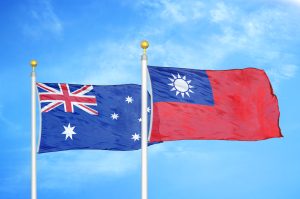While the year of democracy began with something of a farce in Bangladesh, far more credible elections will be held this weekend in Taiwan. Given how China may react to the result – as well as Taiwan’s significance as an Indo-Pacific player in its own regard – these elections are highly consequential. For Australia there are a number of potential implications that are vital to Canberra’s national interests.
The first is the obvious threat to cross-strait relations from Beijing’s response to the result. It is likely that should Democratic Progressive Party (DPP) presidential candidate Lai Ching-te, also known as William Lai, be victorious, the Chinese Communist Party will feel the need to demonstrate its disapproval with a show of force. Such shows of force are disturbing in and of themselves, but they can have considerable effect on the normal sea lines of communication in Northeast Asia that are critical to Australia’s prosperity.
Northeast Asia sees the bulk of Australia’s trade – which is almost exclusively conducted by sea. China, Japan and South Korea are three of Australia’s four largest trading partners, and Taiwan is seventh. This makes stability in the region of critical importance to Canberra. It’s estimated that an invasion of Taiwan would have a $10 trillion impact on the global economy; yet even threats, as well as maritime and airspace incursions, can provoke enormous uncertainty to businesses and raise the costs – both financial and opportunity – of regular trade.
Beyond Beijing’s response to the election results, the different approaches to Taiwan’s unique status by the two largest parties – the DPP and the Kuomintang (KMT) – will be consequential for Australia. The DPP’s signature approach to international relations since 2016 has been the New Southbound Policy. The policy is designed to diversify Taiwan’s economic – and cultural – exchanges away from China, instead focusing on ASEAN, South Asia, Australia, and New Zealand.
The idea behind the policy has not only been to be less economically reliant on Beijing – with its often temperamental approach to trade – but to create a critical mass of interests within the Indo-Pacific that are invested in preserving the status quo across the Taiwan Strait. The hope is that if enough countries in the region see their own national interests in Taiwan’s current freedom, then this will create a powerful deterrent to Beijing.
The New Southbound Policy has been advantageous to Australia. There has been significant growth in Australia’s investment in Taiwan over the past five years, and Australia has become Taiwan’s largest energy supplier, which means that Australia is literally powering a great deal of Taiwan’s economic and other activity. Australia’s agricultural products have a major presence in the Taiwanese market (with Taiwan having a limited capacity to produce food locally), and according to a recent discussion paper from the Australia and New Zealand Chamber of Commerce in Taiwan, Australia has become the second most popular destination for Taiwanese students pursuing higher education.
However, the KMT has different ideas about how best to deter a Chinese invasion. Their approach sees greater value in economic exchange with China, with the goal of creating a strong set of mutually beneficial exchanges that Beijing may not risk disrupting. Therefore it is likely that a KMT administration may be less enthusiastic about the New Southbound Policy, which could hinder the growth of these relationships. However, the KMT has indicated support for Taiwan joining the Comprehensive and Progressive Trans-Pacific Partnership (CPTPP) – something Taipei has sought Australia’s support for.
Less enthusiasm for the New Southbound Policy may have some negative effect on the continued expansion of the Australia-Taiwan relationship. However, Australia’s friendly and sympathetic relationship with Taiwan is not based on any particular party being in power, and whatever new policies arise from the result of the election, Canberra will make the necessary adjustments and efforts to negotiate them.
What is most important to Australia is that the status quo is maintained across the Taiwan Strait. How Taiwan best sees fit to manage cross-strait relations is a matter for Taiwan’s elected representatives. As the state most likely to disrupt the status quo, the greater responsibility for stability in the region falls on China.
What is of further interest to Australia from Taiwan’s elections is understanding the tools used to disrupt Taiwan’s democracy, which could provide lessons for Australia. Taiwan is at the forefront of what Foreign Minister Joseph Wu calls “cognitive warfare” – relentless attempts at creating social distrust in Taiwan’s institutions. Australia is resilient, but not completely immune, to these kinds of attacks, and as the year of democracy progresses how successful those hostile to democracy are will be keenly watched from Canberra.
































